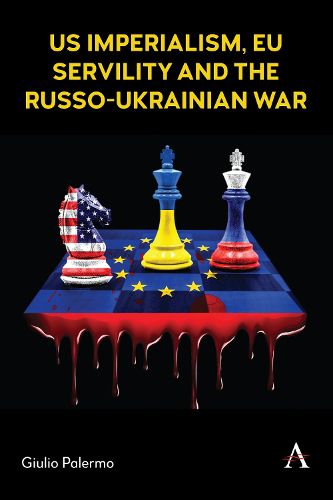Readings Newsletter
Become a Readings Member to make your shopping experience even easier.
Sign in or sign up for free!
You’re not far away from qualifying for FREE standard shipping within Australia
You’ve qualified for FREE standard shipping within Australia
The cart is loading…






The Russo-Ukrainian conflict has distant roots. The book traces its historical and political origins and focuses on its economic consequences. From the picture that emerges, the conflict has little to do with Russia, or Ukraine, but with U.S. imperialist strategies in Europe and its attempt to detach Europe from Russia and China. The long-term strategy of the United States in Ukraine begins well before the 2014 coup. In fact, it is defined in the aftermath of the dissolution of the Soviet Union. The analysis of this process shows an increasing military pressure of the United States on Russia and explains why Russia eventually had no choice but to respond on a military level. But it is by analysing the dynamics of the war, especially in its economic, before military, aspects, that the real underlying interests become clearer. The economic consequences of the war, absolutely predictable and certainly foreseen by the actors involved (with the exception, apparently, of some European politicians), show that the direction of the operation is in Washington and that the real enemy is not in Moscow but in Brussels. Ukraine is only the instrument to force Russia to intervene and expand the penetration of U.S. capital into the European Union. From the point of view of the United States, moreover, the strategy of expansion in Europe is only one piece of the global strategies governing relations with China, which has turned hot in these very years. In fact, between the Minsk agreements and the Russian intervention, something not exactly minor happened on a global level: the pandemic broke out. From an economic point of view, the pandemic is a unique opportunity to accelerate the process of technological and social transformation in which the United States had invested heavily but which was struggling to develop due to a lack of investments and which, by contrast, was advancing rapidly in China thanks to planning. The critique thus develops by analysing the relationship between the war in Ukraine and the anti-pandemic policies as distinct but joint moments of the U.S. global imperialist strategy. Having lost ground in strictly economic competition with Chinese companies, the United States now defends and develops the role of its own companies in Europe by force, through the economic war on Russia. Of course, in this process, European corporations do not stand idly by but must increasingly link up with U.S. corporations and break ties with U.S. enemies. It is in this process of integration between U.S. and European capitals that the economic, political and military choices of the European Union and its individual member states, at first sight apparently contradictory, instead assume full consistency.
$9.00 standard shipping within Australia
FREE standard shipping within Australia for orders over $100.00
Express & International shipping calculated at checkout
The Russo-Ukrainian conflict has distant roots. The book traces its historical and political origins and focuses on its economic consequences. From the picture that emerges, the conflict has little to do with Russia, or Ukraine, but with U.S. imperialist strategies in Europe and its attempt to detach Europe from Russia and China. The long-term strategy of the United States in Ukraine begins well before the 2014 coup. In fact, it is defined in the aftermath of the dissolution of the Soviet Union. The analysis of this process shows an increasing military pressure of the United States on Russia and explains why Russia eventually had no choice but to respond on a military level. But it is by analysing the dynamics of the war, especially in its economic, before military, aspects, that the real underlying interests become clearer. The economic consequences of the war, absolutely predictable and certainly foreseen by the actors involved (with the exception, apparently, of some European politicians), show that the direction of the operation is in Washington and that the real enemy is not in Moscow but in Brussels. Ukraine is only the instrument to force Russia to intervene and expand the penetration of U.S. capital into the European Union. From the point of view of the United States, moreover, the strategy of expansion in Europe is only one piece of the global strategies governing relations with China, which has turned hot in these very years. In fact, between the Minsk agreements and the Russian intervention, something not exactly minor happened on a global level: the pandemic broke out. From an economic point of view, the pandemic is a unique opportunity to accelerate the process of technological and social transformation in which the United States had invested heavily but which was struggling to develop due to a lack of investments and which, by contrast, was advancing rapidly in China thanks to planning. The critique thus develops by analysing the relationship between the war in Ukraine and the anti-pandemic policies as distinct but joint moments of the U.S. global imperialist strategy. Having lost ground in strictly economic competition with Chinese companies, the United States now defends and develops the role of its own companies in Europe by force, through the economic war on Russia. Of course, in this process, European corporations do not stand idly by but must increasingly link up with U.S. corporations and break ties with U.S. enemies. It is in this process of integration between U.S. and European capitals that the economic, political and military choices of the European Union and its individual member states, at first sight apparently contradictory, instead assume full consistency.